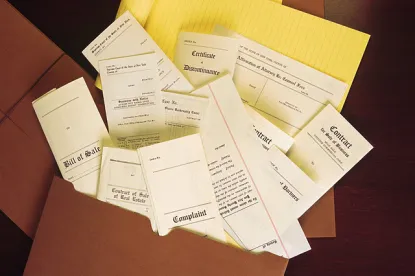Another federal court of appeals has weighed in on the question of whether requiring employees to waive the right to bring a class action against their employer in arbitration or court as a condition of employment violates employees’ rights under Section 7 of the National Labor Relations Act (NLRA).
As we reported previously, the National Labor Relations Board (NLRB) in D.R. Horton, 357 NLRB No. 184 (2012) invalidated such a clauses in arbitration agreements, holding that they violated employee rights under Section 7 of the NLRA. However, on appeal, the Fifth Circuit overruled the decision on two grounds. First, the Fifth Circuit found that the right to proceed collectively is a procedural, not substantive right that can be waived. Second, the court found that the NLRB’s interpretation invalidating such waivers in arbitration agreements conflicted with the Federal Arbitration Act (FAA), which favors the enforcement of arbitration agreements. D.R.Horton v. NLRB, 737 F.3d 344 (5th Circ.2013). The Fifth Circuit reaffirmed its position in Murphy Oil USA, Inc., 361 NLRB No. 72 (2014), enf. Denied 808 F.3d 1013 (2015).
This May, however, the Seventh Circuit, in Lewis v. Epic Systems Corp., 823 F.3d 1147 (7th Cir. 2016), ruled the opposite, finding a class action waiver in an employment agreement was illegal. The Seventh Circuit disagreed with the Fifth Circuit’s view, reaching the decision, among others, that the right to proceed collectively is a substantive right that an employee cannot be forced to waive. The Seventh Circuit also found that the FAA’s criteria relating to non-enforcement of arbitration agreements had been satisfied.
And now the Ninth Circuit has entered the fray, and it has sided whole-heartedly with the Seventh Circuit and ruled against enforcement of waivers. Morris et al. v. Ernst & Young LLP et al., Case No.13-16599 decided August 22, 2016. Like their fellow justices in the Seventh Circuit, the 2-1 Ninth Circuit majority found that the right to proceed collectively was a substantive federal right that employees could not be forced to waive as a condition of employment. The court further found that because a forced waiver of collective action would violate NLRA Section 7 that constituted grounds under the FAA for revocation of that clause.
Given the diametrically opposing decisions rendered by the Fifth Circuit on the one hand, and the Seventh and Ninth Circuits on the other, it seems inevitable that the enforceability of class waivers in the employment context will ultimately be resolved at some future date by the Supreme Court. For now, enforceability of these clauses appears to depend in large part on where the dispute is adjudicated.


 />i
/>i
